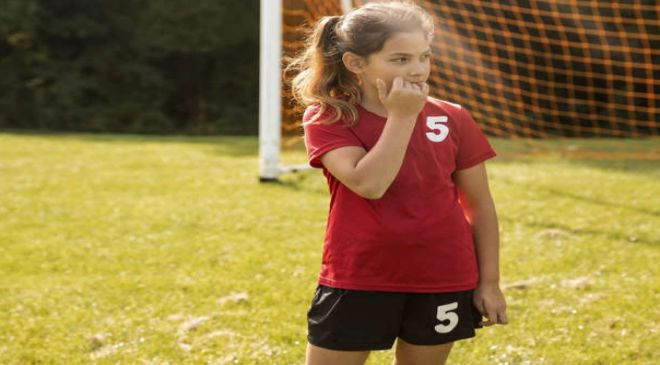Nail biting is a common habit during childhood. But although it can be frustrating for parents, it’s often harmless, and kids usually outgrow it over time. “A lot of kids stop biting their nails as they age and start to look around and see that other people aren’t doing it,” says David Hill, M.D., adjunct assistant professor of pediatrics at University of North Carolina School of Medicine and author of Dad to Dad: Parenting Like a Pro and Co-Parenting Through Separation and Divorce
That said, excessive nail biting can be problematic for kids’ health, causing infection or damage to the skin, nails, and cuticles. We spoke with three pediatricians to better understand why kids bite their nails and how to help them stop.
Why Does My Child Bite Their Nails?
About 20 to 30 percent of the population habitually bites their nails, and the exact cause of nail biting (onychophagia) is unknown. But research shows that children might bite their nails for several reasons—including out of anxiety or physical restlessness. “Because it’s a repetitive habit, it may be a self-soothing behavior,” says Kimberly Montez, M.D., M.P.H., assistant professor of pediatrics at Wake Forest School of Medicine and associate director of Integrating Special Populations for the Maya Angelou Center for Health Equity.
On the other hand, “sometimes it’s purely cosmetic,” says Antwon Chavis, M.D., assistant professor of pediatrics at Oregon Health & Science University. “Some kids really like having short nails.” Nail biting can also happen if children are bored or under-stimulated, he adds.
Consequences of Biting Your Nail
Although nail biting is unsightly in social situations, it’s typically harmless for kids. However, it can become a medical concern if it damages the cuticle, nail, or surrounding skin. “If the skin around the nail is red, painful, or has discharge, your child should be evaluated by their pediatrician,” says Dr. Montez.
Nail biting may also increase the risk for paronychia, a skin infection around the nails. “And if kids play in the dirt a lot, there’s also the opportunity to get parasitic infections from eggs that may be in the dirt,” says Dr. Hill.
Lastly, nail biting can be a sign of depression or anxiety. “If a child is experiencing pain or discomfort from biting their nails but they do it anyway, they may be trying to tell you that they have some anxiety that biting their nails is providing relief for,” says Dr. Chavis.
How to Stop Your Child From Biting Their Nails
Parents should never be punitive or insulting about their kid’s nail-biting habit. “Often, calling attention to the behavior, especially through ridicule or punishment, will cause it to worsen,” says Dr. Montez.
Instead, if you’re disturbed or distressed by nail biting, you can try habit reversal training, which uses positive reinforcement. Most people are unaware of their habits, explains Dr. Hill, so the first step is bringing it to your child’s attention. One way to do this is sitting them in front of the mirror as they bite their nails and saying, “This is what it looks like and feels like when you’re biting your nails.”
Or, if your child is old enough, you can simply ask them about their nail biting. “When you gently bring it to their attention, you can say, ‘Do you feel better when you do that? Or are you just bored?'” says Dr. Chavis. “Kids can give very insightful answers to simple questions.”
The second step is focusing your child’s energy on something else. For example, instead of biting their nails, they may hug a doll, play with a fidget spinner, squeeze a stress ball, or snap a rubber band. “And every time you notice them trying to bite their nails, you remind them that they have a different, more acceptable habit to pursue instead,” says Dr. Hill. Over time, the less desired habit gets replaced with the more desired habit; just remember to give positive reinforcement along the way. For example, “You may say, ‘Oh I like how you remembered to squeeze your stress ball just then,’ or ‘I love how your nails are growing right now. It looks like you haven’t bitten them in a little while,'” says Dr. Hill.
Lastly, “for children who find true relief in nail biting or are experiencing physical restlessness, it’s important to examine the stressors that could be going on in the child’s life,” says Dr. Chavis. “If there’s unaddressed anxiety, it will be difficult to resolve the nail biting without addressing the background stressors.”















































